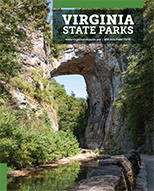Due to the expected impact of the winter storm, all Virginia State Park overnight facilities will be closed from Friday, Jan. 23 through Sunday, Jan. 25. This decision is based on the forecast for unsafe conditions and potential power outages. For updates click here.
Read Our Blogs
Indoor or Outdoor Plumbing?
Another installment of the Virginia Master Naturalist Training in the BRFAL (Blue Ridge Foothills and Lakes Chapter) had me considering indoor or outdoor plumbing!
Honestly, my mind was on overload trying to absorb all the fantastic information presented by Dr Bob Pohlad, Professor of Biology and Horticulture at Ferrum College. So far in this training for a Virginia Master Naturalist, I have learned about Geology (got all excited about rocks!) then I learned about Insects and was reminded that "Bugs are Insects, but not all Insects are Bugs" and am still trying to get my mind around that, and now plants...
So what about this indoor/outdoor plumbing issue? Well it is quite simple, the roots of a plant are the plumbing. So there are those in the plant kingdom that do not have indoor plumbing, and yet are still classified as plants. The Three examples of this are:
- Mosses
- Hornworts
- Liverworts (no, I am not talking about lunch meat)

Bryophytes are Fun at Virginia State Parks!
Apparently, this terminology was called Non-Vascular Plants, but I was reminded that this terminology is no longer used in scientific circles, now we refer to them as Bryophytes. Dr Pohlad said the simplest way to remember this is: Phyte always means PLANT, and Bryo means MOSS.
What else can I tell you about Bryophytes? (By the way this is your homework assignment for your next visit to a Virginia State Park! When you are walking or hiking or traipsing along a trail at your favorite Virginia State Park, take a moment to slow down, look around and see the life that is growing right there at your feet!)
Bryophytes: Produce enclosed reproductive structures (gametangia and sporangia), but they produce neither flowers nor seeds, reproducing via spores.
What is a spore? In biology, a spore is a reproductive structure that is adapted for dispersal and surviving for extended periods of time in unfavorable conditions. Spores form part of the life cycles of many bacteria, plants, algae, fungi and some protozoans. A chief difference between spores and seeds as dispersal units is that spores have very little stored food resources compared with seeds.
So without further adieu, and telling you that "You had to be there!" to get the drift on most of this interesting information, I want to encourage you to GET OUTSIDE! Examine some mosses, fungi, ferns, and even mold! Who knew lack of indoor plumbing would be this fun!
Virginia State Parks have an abundance of family friendly programs to get the kids involved outside and actually learning, click here to view the dozens upon dozens of fun outdoor events presented to you at Virginia State Parks. Fossil finds, wetland canoe trips, astronomy, swamp stomp, forest fables, orienteering, kayaking, the fun is endless! Nearly all of these are free, so what are you waiting for?

There is much to explore at Virginia State Parks, GET OUTSIDE!
Virginia State Parks celebrate Family, Friends and Fungi! (oops, meant to say FUN)
If you have read the article and have a question, please email nancy.heltman@dcr.virginia.gov.
Search for blogs
By Park
Categories
Cabins
Camping
Fishing
History and Culture
Other
Programs and Events
Trails
Volunteers
Water Fun
Archive
2026
2025
2024
2023
2022
2021
2020
2019
2018
2017
2016
2015
2014
2012













